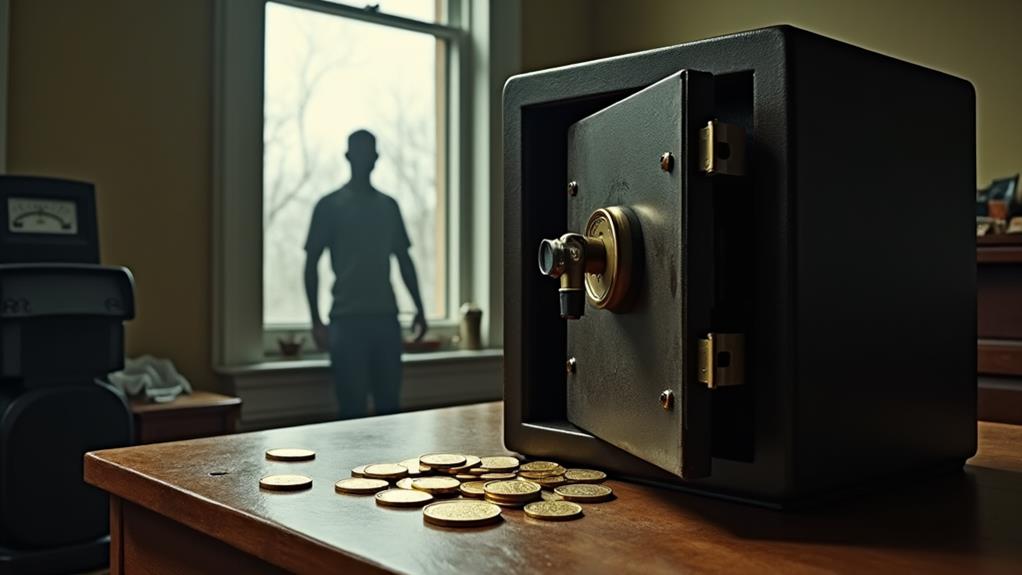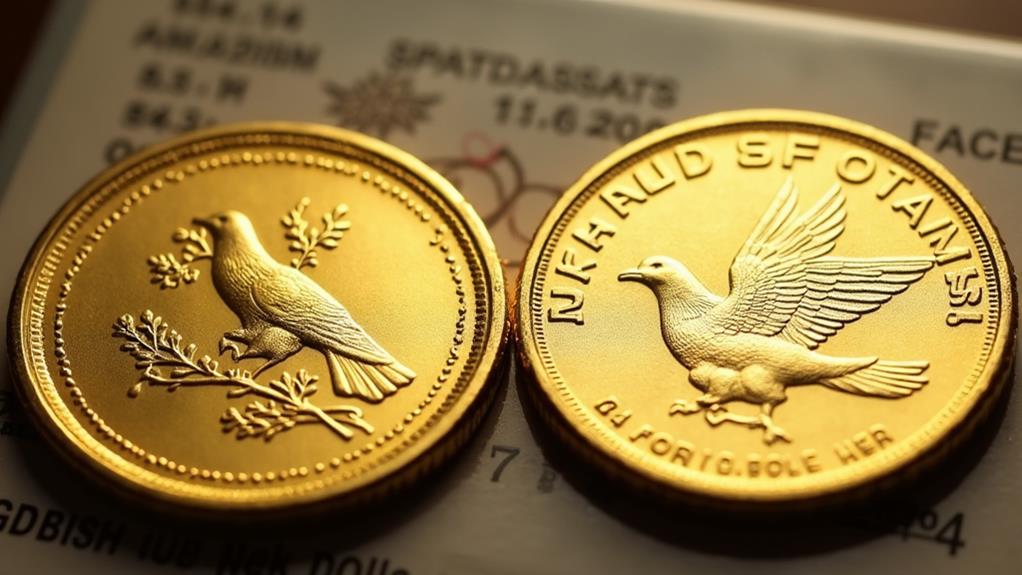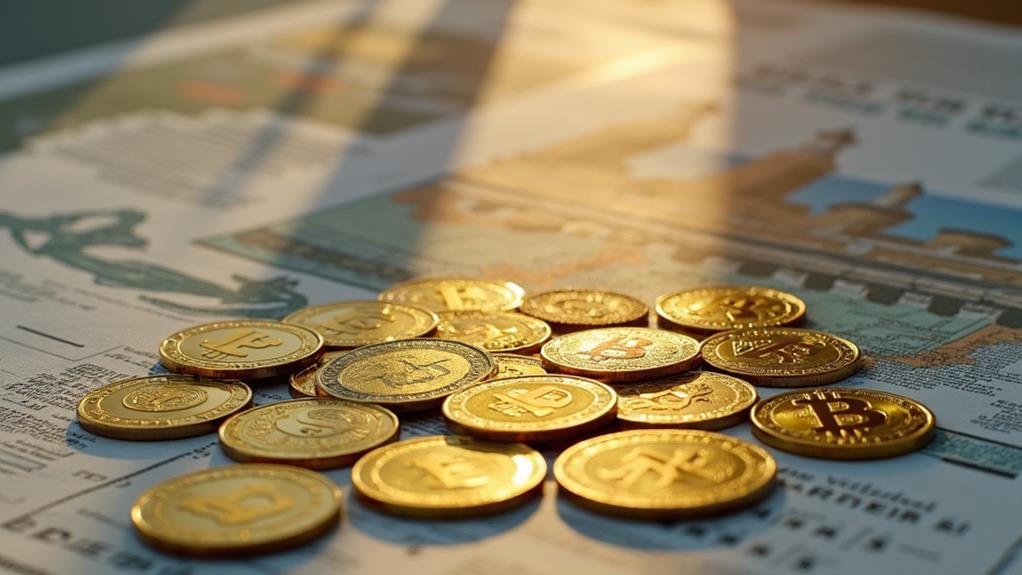Investing in gold coins has long been considered a hedge against economic uncertainty, but this glittering opportunity comes with its own set of challenges. While the allure of precious metals may be strong, potential investors must navigate a minefield of risks that can tarnish their financial goals. From market volatility to the threat of counterfeits, the world of gold coin investment is fraught with pitfalls that demand careful consideration. As we investigate the top ten risks associated with this undertaking, it becomes clear that knowledge and vigilance are equally as valuable as the coins themselves.
Key Insights
- Market volatility can lead to significant price fluctuations, affecting investment value and liquidity.
- Counterfeits and fraud pose risks, requiring careful authentication and dealer reputation verification.
- Limited buyer pools and liquidity challenges may result in difficulty selling coins quickly or at desired prices.
- Storage and security concerns necessitate proper protection against theft, environmental damage, and other risks.
- Grading discrepancies can impact coin valuation, potentially leading to overvaluation or undervaluation of investments.
Market Volatility

Gold coin investments are subject to significant market volatility, making them a potentially risky asset class. Price fluctuations in the precious metals market can be dramatic, often influenced by economic downturns, geopolitical events, and currency fluctuations.
Investors face market timing risk, as the gold price can change rapidly, affecting the value of their portfolio.
An effective investment strategy should account for this volatility. Consider:
- Diversification across asset classes
- Regular monitoring of market trends
- Setting clear investment goals
Dr. Jane Smith, financial analyst, advises: "While gold coins can serve as a hedge against inflation, investors must be prepared for short-term price swings. Understanding these fluctuations is essential for managing investment risk."
Ultimately, the volatile nature of gold prices requires careful consideration and a long-term perspective when including gold coins into an investment portfolio.
Counterfeits and Fraud
A significant concern for investors in the precious metals market is the prevalence of counterfeits and fraudulent activities.
The lack of market transparency can make it challenging for those looking to invest in gold to distinguish genuine gold coins from counterfeit coins. Dealer scams pose a serious threat, as unscrupulous sellers may attempt to pass off fake or low-quality items as authentic precious metal investments.
To mitigate these risks when evaluating gold as an investment option, investors should:
- Research reputable dealers thoroughly
- Verify the authenticity of physical gold through professional grading services
- Be wary of deals that seem too good to be true
- Educate themselves on common counterfeiting techniques
Expert John Smith advises, "Always purchase gold coins from established, well-known dealers to minimize the risk of falling victim to fraud in your gold investment experience."
Storage and Security Concerns

Investing in gold coins comes with significant storage and security challenges that investors must carefully consider.
Protecting these valuable assets from theft and burglary requires strong security measures, including safes, alarm systems, and potentially off-site storage solutions.
Furthermore, investors need to be aware of environmental threats such as fire, flood, and extreme temperatures that can damage or destroy their gold coin investments, requiring proper storage conditions and insurance coverage to mitigate these risks.
Theft and Burglary Risks
One of the most significant concerns for gold coin investors is the ever-present risk of theft and burglary. Owning physical gold bullion or coins makes investors vulnerable to criminal activities, requiring sturdy security measures.
To mitigate theft risk, many choose to store gold in secure facilities, which incur additional storage costs. Nevertheless, even with professional storage, the threat of theft remains.
Investors must weigh the benefits of keeping gold at home against the potential for loss. Home storage exposes coins to physical damage and increases the likelihood of theft.
Security expert John Smith advises, "Invest in a high-quality safe and consider insurance for your gold holdings."
When deciding to invest in gold coins or bullion, carefully evaluate your ability to securely store and protect your assets. The peace of mind from proper security measures often outweighs the associated costs.
Environmental Damage Threats
Protecting gold coins from environmental damage presents a unique set of challenges for investors. While gold itself is resistant to many forms of degradation, improper storage can lead to issues such as tarnishing or corrosion.
Investors must consider factors like humidity, temperature fluctuations, and air quality when choosing storage solutions.
The environmental impact of gold mining further raises sustainability concerns:
- Habitat destruction in mining areas
- Water contamination from chemical runoff
- Mercury use in some extraction processes
- Land degradation and erosion
- High energy consumption in mining operations
These environmental risks associated with gold production can indirectly affect coin investors. Public perception of gold's sustainability may influence market demand and prices.
Moreover, stricter environmental regulations could impact gold mining operations, potentially affecting supply and pricing. Investors should stay informed about industry practices and environmental policies to make well-rounded investment decisions.
Insurance Coverage Limitations
Insurance coverage for gold coins presents a complex challenge for investors, extending beyond environmental concerns to include storage and security issues. When assessing physical gold investments, such as gold coins and bars, investors must be aware of the limitations in insurance policies. Many standard homeowners' insurance policies have strict caps on precious metals coverage, often inadequate for significant gold holdings.
| Coverage Type | Typical Limit | Additional Considerations |
|---|---|---|
| Homeowners | $1,000-$2,500 | May require riders |
| Specialized | Custom | Higher premiums |
| Vault Storage | Variable | Off-site security |
| Bank Safe | Limited | Access restrictions |
| Private Safe | Self-insured | Personal liability |
Investors must carefully evaluate their insurance options to mitigate risks associated with physical gold investments. This may involve purchasing additional riders, specialized policies, or employing secure storage facilities with comprehensive insurance coverage. Balancing security, accessibility, and cost is vital for protecting gold coin investments within an investment portfolio.
Liquidity Challenges
Investing in gold coins presents unique liquidity challenges that potential investors should carefully consider.
The buyer pool for gold coins is often more limited compared to other investment options, which can make it difficult to sell quickly when needed.
Moreover, price fluctuations in the gold market can significantly impact the liquidity of gold coins, as potential buyers may be hesitant to purchase during periods of volatility or declining prices.
Limited Buyer Pool
One significant challenge investors face when dealing with gold coins is the limited buyer pool, which can lead to liquidity issues. The gold market, particularly for rare coins, often has a restricted number of interested buyers, making it difficult to sell quickly when needed.
This limited market for rare coins can impact an investor's ability to execute their gold and silver coins investment strategy effectively.
Consider these potential consequences:
- Longer selling periods
- Lower-than-expected sale prices
- Difficulty finding qualified buyers
- Increased transaction costs
- Reduced flexibility in investment decisions
When investing in gold coins, it's essential to understand that while gold as an investment can be valuable, the process of selling gold coins may not be as straightforward as other forms of gold investing, such as gold bars.
Investors should carefully weigh the risks and benefits of gold coins versus other gold investment options before committing to this strategy.
Price Fluctuation Impact
Compounding the challenges of a limited buyer pool, price fluctuations in the gold market can significantly impact the liquidity of gold coin investments. The price of gold is subject to market manipulation and inflation impact, making it a volatile asset.
For investors contemplating gold coins as a long-term investment, it's essential to understand the pros and cons. While gold can potentially serve as a hedge against economic uncertainty, rapid price changes can make it difficult to manage risk and return.
Investors may find themselves unable to sell gold coins at desired prices during market downturns. This liquidity challenge is particularly pronounced for rare or collectible coins, whose values may not directly correlate with spot gold prices.
To mitigate these risks, experts recommend:
- Diversifying investments beyond gold
- Monitoring market trends closely
- Evaluating professional storage options
- Maintaining a long-term perspective on gold investments
Grading Discrepancies

Uncertainty in grading can pose a significant risk for investors in gold coins. When pondering gold coins as part of an investment strategy, it's vital to understand the potential pitfalls of grading discrepancies.
While gold and other precious metals are often viewed as a safe investment, investing in gold comes with its own set of challenges. The form of gold coins, in particular, requires careful thought.
Grading discrepancies can lead to:
- Overvaluation of lower-quality coins
- Undervaluation of high-quality specimens
- Difficulty in reselling coins with disputed grades
- Potential for fraud in the marketplace
- Inconsistent pricing across different dealers
Investors should seek expert investment advice before purchasing gold directly. Understanding the pros and cons of investing in gold coins is fundamental for making informed decisions.
Reputable grading services and thorough research can help mitigate risks associated with grading discrepancies.
Premium Fluctuations
While grading discrepancies present challenges for gold coin investors, another significant factor to consider is premium fluctuations.
Premium fluctuations refer to the difference between the market price of gold and the cost of gold coins or bars. This premium can vary significantly, affecting the overall investment strategy for gold and silver coins.
Unlike gold ETFs or gold funds, physical gold comes with risks related to these fluctuations. Investors must carefully consider whether buying gold as an investment in coin form aligns with their goals, as premiums can erode potential returns.
Gold's value as a store of wealth may be impacted by these fluctuations, which can be influenced by factors such as coin rarity, demand, and market conditions.
Understanding these premium dynamics is essential for those exploring ways to invest in gold, particularly when choosing between gold bars or coins.
Tax Implications

Gold coin investors' tax considerations can significantly impact their overall returns. Unlike stocks or ETFs, physical gold coins are subject to different tax implications. When you sell physical gold, you may face income tax on investment gains, potentially at higher rates than limited capital gains on paper gold investments like gold stocks or gold ETFs.
It's vital to understand these distinctions:
- Potential for higher tax rates on physical gold sales
- Intricacy in reporting gold coin transactions
- Lack of preferential tax treatment compared to other investments
- Possible need for professional tax advice
- Risk of overlooking tax obligations
Investors should carefully weigh the tax implications of gold coins against alternatives like gold bars or paper gold.
Proper documentation of purchases and sales is fundamental for accurate reporting. Consult with a tax professional to traverse the intricacies of gold coin investments and optimize your tax strategy.
Dealer Reputation Risks
Numerous risks associated with gold coin investments stem from the reputation and practices of dealers. When investing in gold coins, it's essential to research and select reputable dealers to avoid potential pitfalls. Unscrupulous dealers may misrepresent the amount of gold in coins or sell counterfeit products.
While gold can be a good investment, dealing with disreputable sellers can turn it into a costly mistake.
To mitigate these risks:
- Verify the dealer's credentials and history
- Compare prices across multiple sellers
- Seek expert opinions on coin authenticity
Dr. Jane Smith, a numismatist, advises, "Before you buy gold coins or gold jewelry, ensure the dealer is accredited and has a track record of fair practices."
Economic Policy Impact

Economic policies implemented by governments and central banks can significantly influence the value of gold coin investments. While gold may provide a hedge against inflation and economic uncertainty, its performance can be affected by various policy decisions. The price of gold rises during times of economic instability, but it is essential to consider the lack of income generation compared to stocks or bonds.
Investors should be aware of the following emotional factors when holding gold:
- Fear of missing out on potential gains
- Anxiety over economic downturns
- Sense of security during market volatility
- Frustration with gold's price fluctuations
- Pride in owning a tangible asset
As gold performs differently from traditional investments, allocating a portion of one's portfolio to gold coins can offer diversification benefits.
Nevertheless, it is vital to understand that economic policies can impact gold prices both positively and negatively, affecting the overall value of gold investments.
Long-term Performance Uncertainty
While economic policies play a significant role in gold's short-term performance, investors must also consider the long-term uncertainty associated with gold coin investments. The decision to invest in gold coins carries inherent risks due to the unpredictable nature of the precious metals market.
Although gold is typically seen as a safe-haven asset, its long-term performance can be volatile. Investors often buy gold as a hedge against inflation, but the performance of gold over extended periods may not always align with expectations.
Gold could underperform other asset classes, and much gold investment relies on speculation rather than fundamental value. While some investors turn to gold during economic turmoil, it is essential to recognize that similar to gold, all investments carry risks.
Careful consideration of historical trends and future market projections is vital before committing to gold coin investments.
My Final Thoughts
Investing in gold coins requires careful consideration of numerous risks. Market volatility, counterfeiting, storage concerns, and liquidity issues pose significant challenges. Investors must conduct thorough research, verify authenticity, and secure proper storage. The case of the 2012 tungsten-filled gold bars in Manhattan highlights the significance of vigilance. While gold coins can diversify portfolios, understanding these risks is vital for making informed decisions. Balancing potential rewards against these risks remains fundamental for successful gold coin investments.







